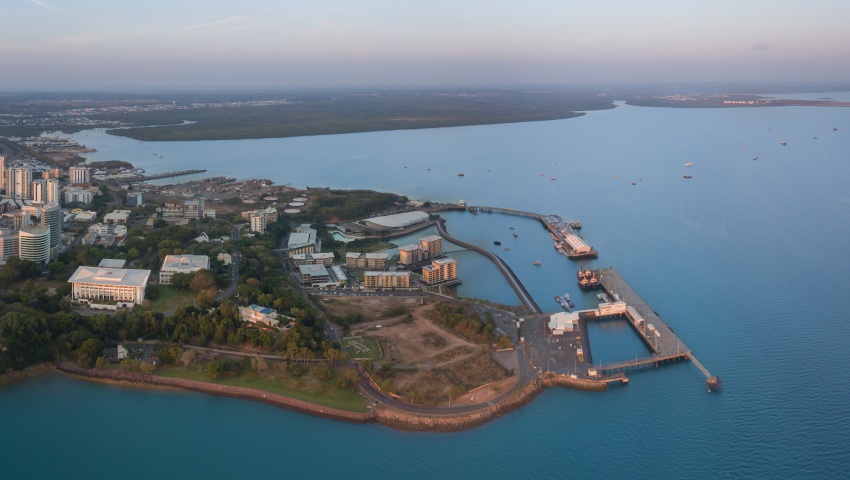The Commonwealth government must “take a shot at redemption” and scrap Chinese firm Landbridge’s leasing rights over the Port of Darwin, according to a senior strategist.
To continue reading the rest of this article, please log in.
Create free account to get unlimited news articles and more!
Last week, it was reported that Minister for Defence Peter Dutton has requested a review of Chinese company Landbridge’s controversial 99-year lease of the Port of Darwin.
This is in response to mounting CCP aggression, displayed both overtly via port militarisation and covertly through President Xi Jinping’s manipulation of the private sector.
According to Peter Jennings, executive director of the Australian Strategic Policy Institute (ASPI), Defence must expedite the review process and move swiftly to correct a “dreadful policy error” made by the Coalition government in 2015.
“Leave to one side that policy snafu and ask instead what has happened since 2015 that should force a rethink of the lease,” Jennings writes.
“The answer is that strategic change is reshaping our region, raising serious risks to stability and forcing fundamental shifts in our defence planning.”
Jennings writes that President Xi has displayed “aggressive” ambitions to dominate the Indo-Pacific and “supplant” the US as the region’s hegemon, while also weakening American allies.
This, according to Jennings, suggests that Beijing has “no interest” in fulfilling its supposed pledge to “share responsibility for regional and global security”, as outlined in Australia’s foreign policy white paper in 2017.
“In the South China Sea, over Taiwan, at the border with India and in its dealing with Australia, Beijing shows that its aim is to destroy the international order and replace it with its own authoritarian control,” Jennings continues.
ASPI’s executive director also points to the deteriorating economic relationship between Australia and China.
According to Jennings, Beijing has thrown its economic weight around as an “instrument of coercion and punishment”.
“In the view of the Chinese embassy, Australia is responsible for everything that is negative in the relationship,” he writes.
“China’s deputy ambassador told a Canberra audience recently that those who ‘sabotage the friendship between our two countries … will be casted [sic] aside in history. Their children will be ashamed of mentioning their names in the history’.
“In this state of mind, any Australian point of difference with China will be treated as ‘sabotage’ to be punished.”
Jennings goes on to express concern over President Xi’s recent push to exert greater control over Chinese and Hong Kong businesses via its ‘national intelligence law’, which effectively requires organisations to tow the CCP line.
“The June 2020 national security law for Hong Kong claims to apply the same coercive powers over Hong Kong citizens and businesses. Beijing asserts in Article 38 of the law that it can apply to anyone, anywhere in the world,” he adds.
The strategist notes that at the time of the Port of Darwin lease, some commentators dismissed concerns as “paranoia”, citing China Matters director Linda Jakobson’s assertion that the “existence of armed militias and connections to the party are integral to the way society functions in China”.
Jennings continues: “What has become clearer since is that the CCP under Xi has significantly reasserted party control of the business sector.
“As Alibaba’s Jack Ma has found, displeasing the party can lead to public disappearance and hefty fines.
“Not surprisingly, Chinese businesses will go to considerable lengths to please the CCP.”
Marketing material from Landbridge, Jennings observes, describes the firm as the “Nation’s brand, world’s Landbridge”, focused on “actively responding to the call of the state”, and contributing to the “realisation of the Chinese dream”.
In a separate video, Landbridge stated that it viewed the Port of Darwin as “building an important maritime co-operation pivot for the One Belt and One Road”, contributing a “more powerful port strength”.
Jennings writes: "It would be wrong to dismiss such language as just what Chinese businesses do to curry favour with the CCP. Delivering on Xi’s key objectives results in favourable attention from party leaders and access to financing.
“The only sensible national response is to ask what Chinese business support for CCP objectives might mean for Chinese-owned and -controlled Australian critical infrastructure — ports, the electricity grid, gas pipelines, information technology, agricultural businesses — at a time when the CCP is ‘punishing’ Australia.”
Another key justification for scrapping the lease is, in Jennings’ view, the shift in US foreign policy, which was triggered under the Trump administration and continues under the Biden administration.
The analyst observed that the US military has recognised the growing risk of conflict in the Indo-Pacific, adding that the Darwin Port would play a key strategic role in the event of a confrontation.
“Washington is rapidly shaping a strategy of ‘dispersal’ of US forces in times of crisis, to reduce the likelihood of successful attacks on places like Guam and Japan,” he writes.
“In these scenarios, northern Australia takes on added strategic importance to the security of our entire region. This explains in part why the government added an additional $200 million to reach a total of $747 million in spending on defence training ranges in the north.
“Remember, just about every litre of fuel, every round of ammunition and every piece of military equipment used at those training ranges will be offloaded at the Port of Darwin.”
In light of these concerns, Jennings urges all Indo-Pacific countries to assess critical infrastructure vulnerabilities “inherent in the presence of large Chinese businesses with their obligations to the CCP”.
He concludes: “This forces an uncomfortable break with past hopes for mutually beneficial business relations, but hard strategic reality must shape what happens from now.”
Get involved with the discussion and let us know your thoughts on Australia's future role and position in the Indo-Pacific region and what you would like to see from Australia's political leaders in terms of partisan and bipartisan agenda setting in the comments section below, or get in touch with
Charbel Kadib
News Editor – Defence and Security, Momentum Media
Prior to joining the defence and aerospace team in 2020, Charbel was news editor of The Adviser and Mortgage Business, where he covered developments in the banking and financial services sector for three years. Charbel has a keen interest in geopolitics and international relations, graduating from the University of Notre Dame with a double major in politics and journalism. Charbel has also completed internships with The Australian Department of Communications and the Arts and public relations agency Fifty Acres.

 Login
Login








